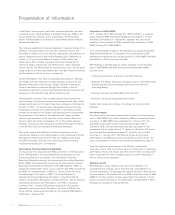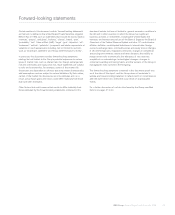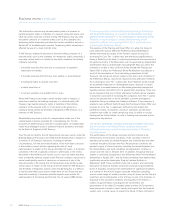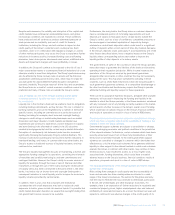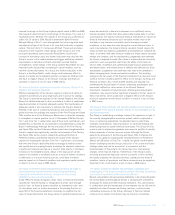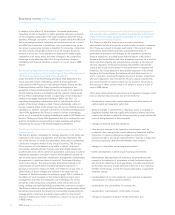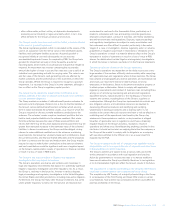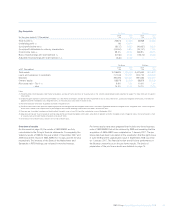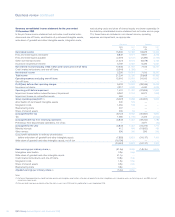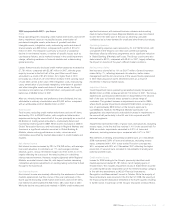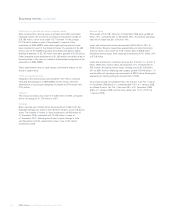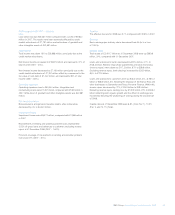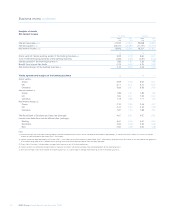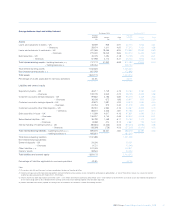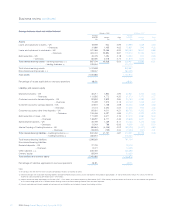RBS 2008 Annual Report Download - page 35
Download and view the complete annual report
Please find page 35 of the 2008 RBS annual report below. You can navigate through the pages in the report by either clicking on the pages listed below, or by using the keyword search tool below to find specific information within the annual report.
RBS Group Annual Report and Accounts 200834
Business review continued
The Group’s insurance businesses are subject to inherent risks
involving claims.
Future claims in the Group’s general and life assurance business may
be higher than expected as a result of changing trends in claims
experience resulting from catastrophic weather conditions,
demographic developments, changes in mortality and other causes
outside the Group’s control. These trends could affect the profitability of
current and future insurance products and services. The Group
reinsures some of the risks it has assumed and is accordingly exposed
to the risk of loss should its reinsurers become unable or unwilling to
pay claims made by the Group against them.
The Group’s operations have inherent reputational risk.
Reputational risk, meaning the risk to earnings and capital from negative
public opinion, is inherent in the Group’s business. Negative public
opinion can result from the actual or perceived manner in which the
Group conducts its business activities or from actual or perceived
practices in the banking and financial industry. Negative public opinion
may adversely affect the Group’s ability to keep and attract customers
and, in particular, corporate and retail depositors. The Group cannot
ensure that it will be successful in avoiding damage to its business from
reputational risk.
In the United Kingdom and in other jurisdictions, the Group is
responsible for contributing to compensation schemes in respect of
banks and other authorised financial services firms that are unable to
meet their obligations to customers.
In the United Kingdom, the Financial Services Compensation Scheme
(the “Scheme”) was established under the FSMA and is the UK’s
statutory fund of last resort for customers of authorised financial
services firms. The Scheme can pay compensation to customers if a firm
is unable, or likely to be unable, to pay claims against it and, if the
Banking Bill is enacted in its current form, may be required to make
payments either in connection with the exercise of a stabilisation power
or in exercise of the bank insolvency procedures under that Bill. The
Scheme is funded by levies on firms authorised by the FSA, including the
Group. In the event that the Scheme raises funds from the authorised
firms, raises those funds more frequently or significantly increases the
levies to be paid by such firms, the associated costs to the Group may
have a material impact on its results of operations and financial
condition. During the financial year ended 31 December 2008, the Group
made a provision of £150 million related to a levy by the Scheme.
In addition, to the extent that other jurisdictions where the Group
operates have introduced or plan to introduce similar compensation,
contributory or reimbursement schemes (such as in the United States
with the Federal Deposit Insurance Corporation), the Group may make
further provisions and may incur additional costs and liabilities, which
may negatively impact its financial condition and results of operations or
result in a loss of value in RBS shares.
The Group’s business and earnings may be affected by
geopolitical conditions.
The performance of the Group is significantly influenced by the
geopolitical and economic conditions prevailing at any given time in the
countries in which it operates, particularly the United Kingdom, the
United States and other countries in Europe and Asia. For example, the
Group has a presence in countries where businesses could be exposed
to the risk of business interruption and economic slowdown following
the outbreak of a pandemic, or the risk of sovereign default following
the assumption by governments of the obligations of private sector
institutions. Similarly the Group faces the heightened risk of trade
barriers, exchange controls and other measures taken by sovereign
governments which may impact a borrower’s ability to repay. Terrorist
acts and threats and the response to them of governments in any of
these countries could also adversely affect levels of economic activity
and have an adverse effect upon the Group's business.
The restructuring proposals for ABN AMRO are complex and may not
realise the anticipated benefits for the Group.
The restructuring plan in place for the integration and separation of
ABN AMRO into and among the businesses and operations of the
consortium members is complex, involving substantial reorganisation of
ABN AMRO’s operations and legal structure. In addition, the plan
contemplates activities taking place simultaneously in a number of
businesses and jurisdictions. Although integration efforts are well
underway and are being advanced on a number of fronts, the
implementation of the reorganisation and the realisation of the forecast
benefits within the planned timescales, particularly given current market
and economic conditions, remains challenging, although the Group
remains confident that such goals will be achieved. Execution of the
restructuring requires management resources previously devoted to the
Group businesses and the retention of appropriately skilled ABN AMRO
staff. The Group may not realise the benefits of the acquisition or the
restructuring when expected or to the extent projected. It is not expected
that the State of the Netherlands’ acquisition of Fortis Bank Nederland’s
shares in RFS Holdings, which was effected in December 2008, will
materially affect the integration benefits envisaged by the Group.
The recoverability of certain deferred tax assets recognised by the
Group depend on the Group's ability to generate sufficient future
taxable profits and there being no adverse changes to tax legislation
In accordance with IFRS, the Group has recognised deferred tax assets
on losses available to relieve future profits from tax only to the extent
that it is probable that they will be recovered. The losses are quantified
on the basis of current tax legislation and are subject to change in
respect of the rate of tax or the rules for computing taxable profits and
allowable losses. Failure to generate sufficient future taxable profits or
changes in tax legislation may reduce the recoverable amount of the
recognised deferred tax assets.


